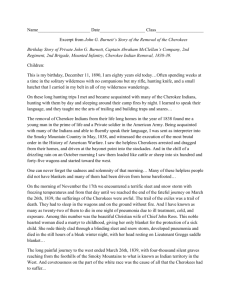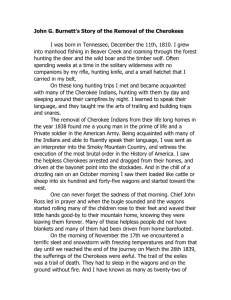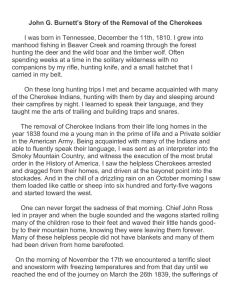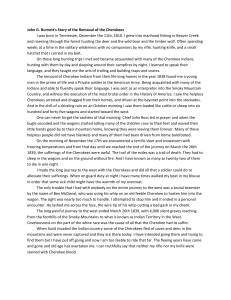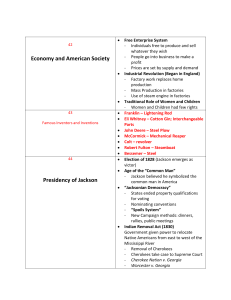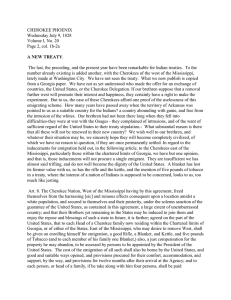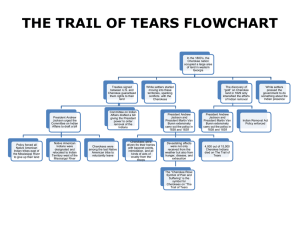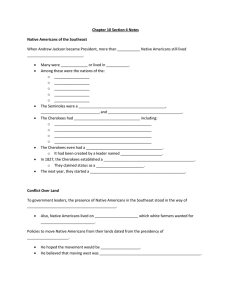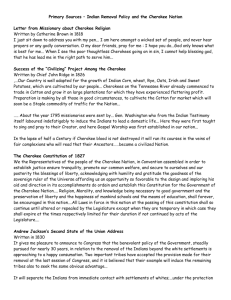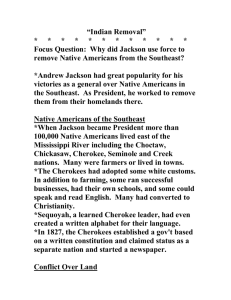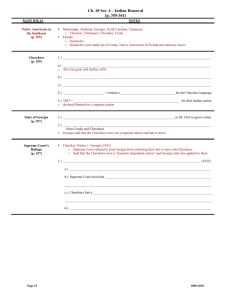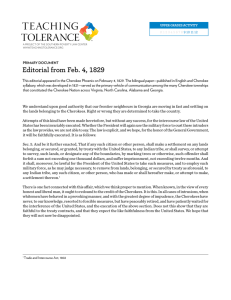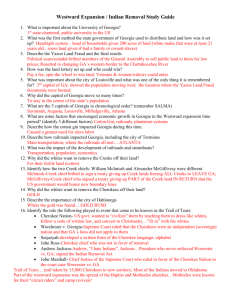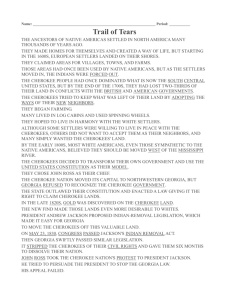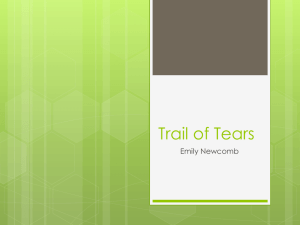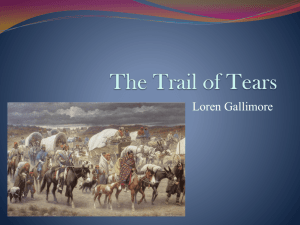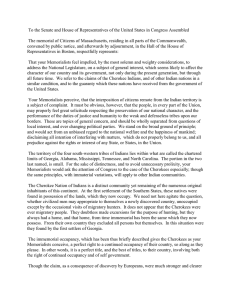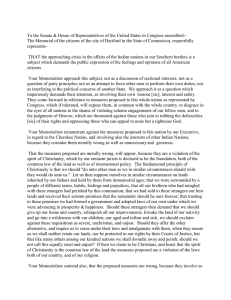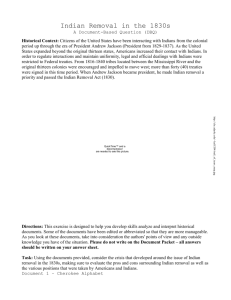Primary Source Docs Indian Removal
advertisement
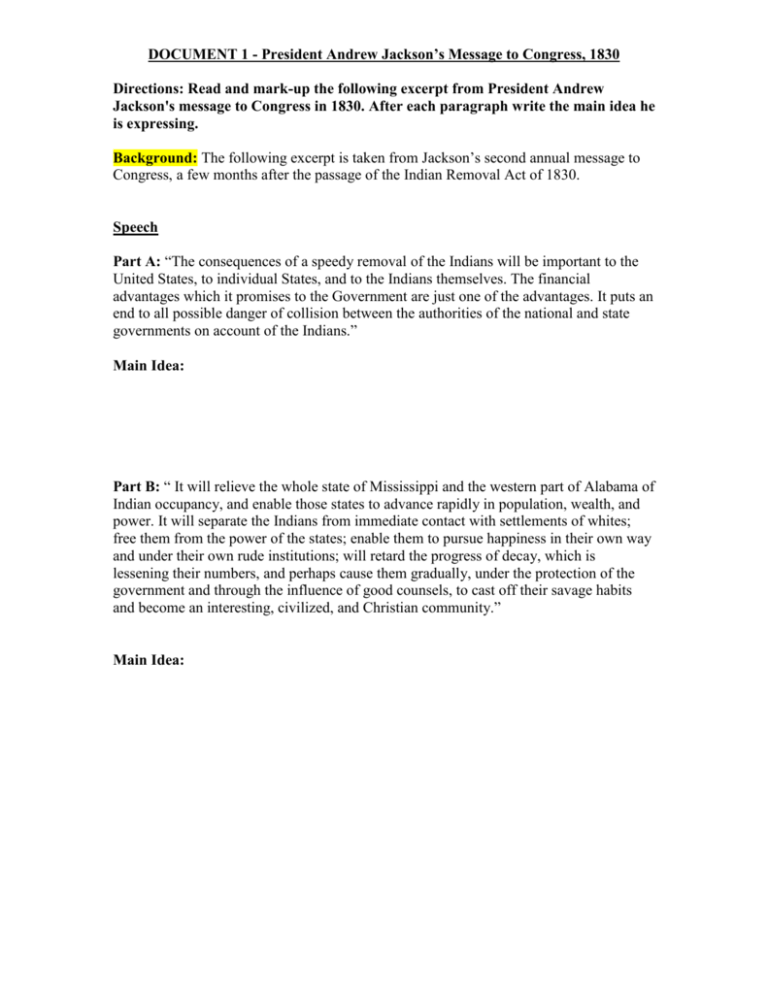
DOCUMENT 1 - President Andrew Jackson’s Message to Congress, 1830 Directions: Read and mark-up the following excerpt from President Andrew Jackson's message to Congress in 1830. After each paragraph write the main idea he is expressing. Background: The following excerpt is taken from Jackson’s second annual message to Congress, a few months after the passage of the Indian Removal Act of 1830. Speech Part A: “The consequences of a speedy removal of the Indians will be important to the United States, to individual States, and to the Indians themselves. The financial advantages which it promises to the Government are just one of the advantages. It puts an end to all possible danger of collision between the authorities of the national and state governments on account of the Indians.” Main Idea: Part B: “ It will relieve the whole state of Mississippi and the western part of Alabama of Indian occupancy, and enable those states to advance rapidly in population, wealth, and power. It will separate the Indians from immediate contact with settlements of whites; free them from the power of the states; enable them to pursue happiness in their own way and under their own rude institutions; will retard the progress of decay, which is lessening their numbers, and perhaps cause them gradually, under the protection of the government and through the influence of good counsels, to cast off their savage habits and become an interesting, civilized, and Christian community.” Main Idea: DOCUMENT 2 - Samuel’s Memory Background: This is an excerpt from the diary of a Cherokee boy named Samuel. “We walked for many days. I don't know how long it has been since we left our home, but the mountains are behind us. Each day, we start walking a little later. They bury the dead in shallow graves, because the ground is frozen. As we walk past white towns, the whites come out to watch us pass. No words are spoken to them. No words are said to us. They made us leave our homes. They made us walk to this new place we are heading in the middle of winter. I do not like these people.” Main Idea:Here the speaker tells is experience of how they were kicked out of their land in the cold weather where so many lives were losted and how they walked through the houses of the American’s and they kept looking at them and altering no words to them they just watched them pass by. “My mother is coughing now. She looks worn Her hands and face are burning. hot. My aunts and uncles try to take care of me, so she can get better. I don't want to leave her alone. I just want to sit with her. I want her to stroke my hair, like she used to do.” Main Idea: “When I went to sleep last night, my mother was hot and coughing worse than usual. When I woke up, she was cold. I tried to wake her up, but she lay there. The soft warmth she once was, she is no more. I kept touching her, as hot tears stream down my face. She couldn't leave me. She wouldn't leave me.” Main Idea: “We bury her in a shallow grave by the road. The soldiers make us continue walking. My uncle talks to me, trying to comfort me. I walk in loneliness. I know what it is to hate. I hate those white soldiers who took us from our home. I hate the soldiers who make us keep walking through the snow and ice toward this new home that none of us ever wanted. I hate the people who killed my father and mother. None of them care about me or my people. All they ever saw was the color of our skin. All I see is the color of theirs and I hate them. Main Idea: DOCUMENT 3- John G. Burnett’s Story of the Removal of the Cherokees Background: This is an oral history of US Army Private John G. Burnett, who served in the US Army during the Cherokee Indian Removal in 1838-39. I was born in Tennessee, December the 11th, 1810. I grew into manhood fishing in Beaver Creek and roaming through the forest hunting the deer and the wild boar and the timber wolf. Often spending weeks at a time in the solitary wilderness with no companions but my rifle, hunting knife, and a small hatchet that I carried in my belt. On these long hunting trips I met and became acquainted with many of the Cherokee Indians, hunting with them by day and sleeping around their campfires by night. I learned to speak their language, and they taught me the arts of trailing and building traps and snares. The removal of Cherokee Indians from their life long homes in the year 1838 found me a young man in the prime of life and a Private soldier in the American Army. Main Idea: Being acquainted with many of the Indians and able to fluently speak their language, I was sent as an interpreter into the Smoky Mountain Country, and witness the execution of the most brutal order in the History of America. I saw the helpless Cherokees arrested and dragged from their homes, and driven at the bayonet point into the stockades. And in the chill of a drizzling rain on an October morning I saw them loaded like cattle or sheep into six hundred and forty-five wagons and started toward the west. Main Idea: One can never forget the sadness of that morning. Chief John Ross led in prayer and when the bugle sounded and the wagons started rolling many of the children rose to their feet and waved their little hands good-by to their mountain home, knowing they were leaving it forever. Many of these helpless people did not have blankets and many of them had been driven from home barefooted. On the morning of November the 17th we encountered a terrific sleet and snowstorm with freezing temperatures and from that day until we reached the end of the journey on March the 26th, 1839, the sufferings of the Cherokees were awful. The trail of the exiles was a trail of death. They had to sleep in the wagons and on the ground without fire. And I have known as many as twenty-two of them to die in one night. Main Idea: DOCUMENT 4- Supreme Court Justice John Marshall’s Decision in Worcester v. Georgia Background: When the state of Georgia began forcibly removing Cherokees from their lands, the tribe appealed to the Supreme Court, asking it to enforce its treaty rights. In the 1832 case of Worcester v. Georgia the Court ruled in the Cherokees’ favor, deciding that the tribe constituted a sovereign nation. President Jackson refused to enforce the verdict, arguing that the Cherokees were not an independent nation but were merely inhabitants of the state of Georgia. The following excerpt is taken from the Court’s majority opinion, authored by Chief Justice John Marshall. Decision “From the commencement of our government, congress has passed acts to regulate trade and intercourse with the Indians; which treat them as nations, respect their rights, and manifest a firm purpose to afford that protection which treaties stipulate.” Main Idea: “All these acts, and especially that of 1802, which is still in force, consider the several Indian nations as distinct political communities, having territorial boundaries, within which their authority is exclusive, and having a right to all the lands within those boundaries, which is not only acknowledged, but guarantied by the United States. “ Main Idea: “The Cherokee nation, then, is a distinct community, occupying its own territory, with boundaries accurately described, in which the laws of Georgia can have no force, and which the citizens of Georgia have no right to enter.” Main Idea:
